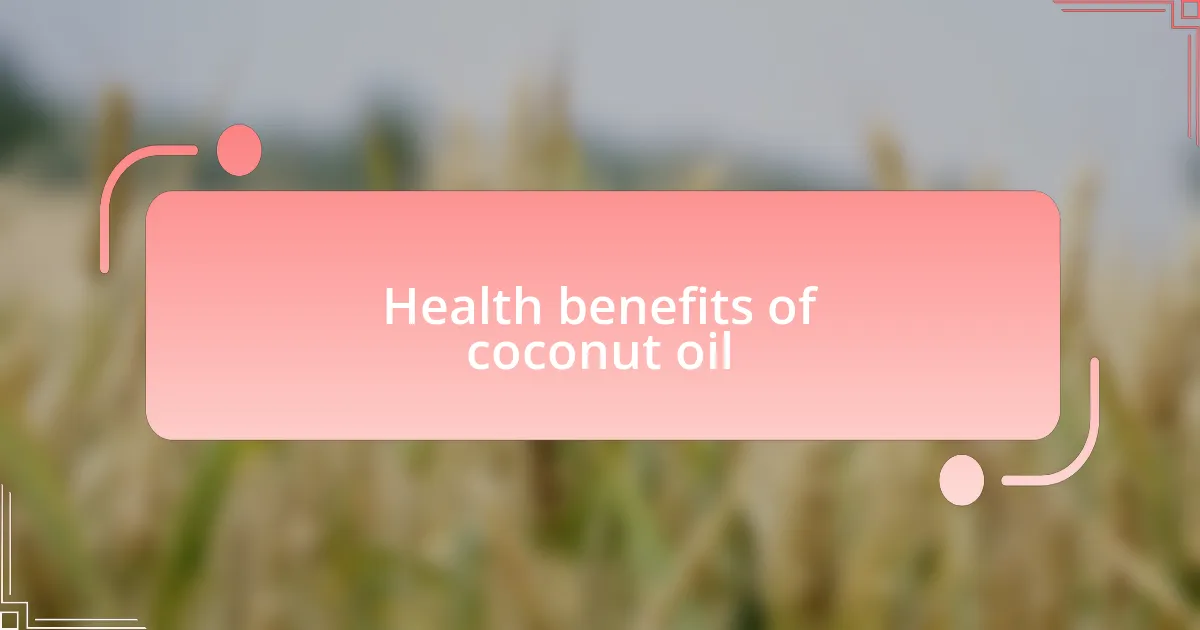Key takeaways:
- Healthy eating is crucial for personal wellness and community sustainability, promoting overall well-being.
- Coconut oil, composed mainly of medium-chain triglycerides, offers various health benefits, including potential brain and skin health support.
- Despite its advantages, the high saturated fat content of coconut oil raises concerns about heart health and cholesterol levels.
- The environmental impact of coconut oil production, including deforestation, necessitates mindful consumption choices.

Healthy eating and its importance
Healthy eating is more than just a trend; it’s a lifestyle choice that profoundly impacts our well-being. I remember a time when I ignored nutrition in favor of convenience, and the effects were glaring—I felt fatigued and sluggish. It’s incredible how the right foods can restore energy and improve mental clarity; have you ever noticed how a wholesome meal can change your entire day?
The importance of healthy eating extends beyond personal wellness; it influences our communities and environment, too. I once joined a community garden initiative, and it was enlightening to see how fresh, locally sourced produce fosters a sense of togetherness and responsibility. Isn’t it fascinating to think how our food choices can contribute to a more sustainable world?
Moreover, embracing healthy eating can be a transformative journey. As I shifted my focus to more nutrient-dense foods, I found that my cravings changed over time; I began to appreciate the vibrant taste of fresh fruits and vegetables. Isn’t it amazing how our bodies adapt and respond positively to wholesome nourishment?

What is coconut oil
Coconut oil is derived from the flesh of mature coconuts, and its rich, creamy texture appeals to many. I still remember the first time I tasted it; it had this delightful tropical aroma that instantly transported me to a beach paradise. It’s commonly used in cooking and baking, and it’s hard to resist its charm.
This oil is primarily composed of saturated fats, particularly medium-chain triglycerides (MCTs). I was surprised to learn that MCTs can be metabolized differently than other fats, providing a quick source of energy rather than being stored in the body. Have you ever experienced a boost of energy after using coconut oil in your meals?
Beyond the kitchen, coconut oil has become a popular ingredient in skincare and hair care due to its moisturizing properties. I remember applying it to my hair after a long, sun-soaked day, and it felt rejuvenating—like a refreshing drink for my strands. It’s fascinating how a single ingredient can play multiple roles in our lives, isn’t it?

Nutritional profile of coconut oil
Coconut oil’s nutritional profile is quite intriguing, mainly due to its high fat content, which is about 100% of its composition. In particular, around 90% of these fats are saturated, with medium-chain triglycerides being the star players. I remember reading fascinating research about MCTs that revealed how they can be rapidly absorbed and utilized for energy, making coconut oil a topic of interest in discussions about healthy fats.
One thing I found particularly interesting is how coconut oil can potentially influence heart health. Despite being high in saturated fats, some studies suggest that it may raise good cholesterol levels while keeping bad cholesterol in check. Have you ever thought about the balance of fats in your diet? I often reflect on how we perceive fat in our meals and how coconut oil challenges the traditional perspectives on dietary fats.
Another aspect I really value is the presence of antioxidants in coconut oil, including tocopherols, which are forms of vitamin E. These antioxidants can help to combat oxidative stress in the body. I remember adding coconut oil to my smoothie one morning and feeling not just energized but also rejuvenated. It’s incredible how nature’s foods can pack such powerful nutrients once you dive into their profiles!

Health benefits of coconut oil
Coconut oil offers a variety of health benefits that go beyond its rich flavor. One of the most compelling aspects for me is its potential to support brain health. I remember a time when I was looking for natural ways to maintain focus during long hours of work. Incorporating coconut oil into my diet seemed to enhance my mental clarity, which aligns with research suggesting that the medium-chain triglycerides in coconut oil may provide an alternative energy source for the brain. Have you ever experienced a foggy afternoon and wished for a quick, healthy boost?
Another interesting benefit is coconut oil’s antimicrobial properties. I used to rely heavily on commercial products to combat colds and infections, but then I discovered that coconut oil might help in supporting the immune system. When I started using it in my cooking, I felt more resilient, especially during the colder months. It turns out that the lauric acid present in coconut oil can convert into monolaurin, which is known for its efficacy against harmful bacteria and viruses. Why not consider adding a tablespoon of coconut oil to your soups or smoothies?
Moreover, I’ve found coconut oil to be beneficial for skin health as well. There was a period when my skin felt dry and lacked luster, and I thought to give coconut oil a try. It worked wonders as a moisturizer! Not only did it hydrate my skin, but the antioxidants also seemed to promote a healthier complexion. Seriously, have you ever thought about how what you eat can have a direct impact on your skin? The more I explore the benefits of ingredients like coconut oil, the more I’m convinced that what’s on our plates truly reflects in our appearance and overall well-being.

Potential drawbacks of coconut oil
It’s important to acknowledge that not all fats are created equal, and coconut oil is no exception. While I enjoy using it in my cooking, I sometimes worry about its high saturated fat content, which can be a concern for heart health. Have you ever thought about how our dietary choices impact our cholesterol levels? Research indicates that consistently consuming saturated fats can increase levels of LDL cholesterol, often referred to as the “bad” cholesterol.
When I started using coconut oil frequently, I noticed that some health discussions began to emphasize moderation. I remember feeling torn because it was marketed as a superfood, yet I couldn’t shake off my doubts. I often ask myself: Is it better to enjoy a variety of healthy fats or rely heavily on just one? It’s a pivotal question because excessive reliance on coconut oil could potentially lead to an imbalance in nutrient intake, ultimately affecting overall health.
Another aspect I’ve considered is the environmental impact of coconut oil production. During a conversation with a friend passionate about sustainability, I learned about the deforestation issues linked to coconut plantations. This made me reflect on my choices. When I enjoy a product, I want to learn about its origins and consequences. It’s a reminder that while coconut oil has its merits, considering its broader impact is essential for making truly healthy eating decisions.